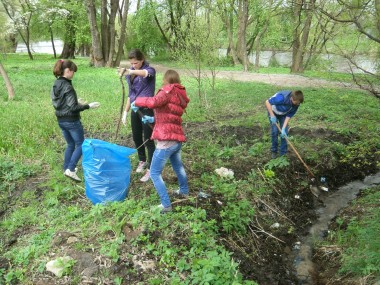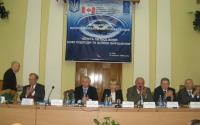Kyiv, 25 September: 196 participants in the International Conference “Quality of Drinking Water: New Approaches and Solutions” have gathered to discuss conceptual principles of providing Ukraine’s population with quality drinking water and the roles of central and regional authorities in this process.
The Conference was organized by the Ministry of Housing and Municipal Economy of Ukraine and the National Academy of Sciences of Ukraine with support from the UNDP-led Municipal Governance and Sustainable Development Programme (MGSDP).
Strategic Work Plan of the Ministry of Housing and Municipal Economy of Ukraine elaborated in 2008 says that 66% of the enterprises of the centralized water supply system provide population with the drinking water not matching the requirements of existing state standards, while about 20% of the water supply enterprises work based on the temporary allowances. The average level of water losses in the networks is 39%, and the equipment of the enterprises of centralized water supply and sewerage systems are worn-out by 62%.
There are 1200 settlements with more than 800 thousand population, where it is prohibited to drink local water through ecological or production-induced reasons or due to absence of local water sources. Many settlements in rural areas, especially in AR Crimea, do not have access to centralized water supply at all.
According to Oleksiy Kucherenko, Minister of Housing and Municipal Economy, in Ukraine up to 300-350 liters of water per capita are produced, while 1 person needs only 3 liters per day for drinking purposes. Use of low-quality drinking water affects to some extent Ukraine being behind developed countries on average life expectancy and high mortality rate.
“To provide clean drinking water to the population by treating the whole volume of water being supplied through the centralized water supply system is impossible from the technical point of view and is very difficult from the economic point of view. Ukraine lacks financial resources to ensure the treatment of the whole volume of water to be used in households up to the level of quality standards of drinking water. We need to transfer to the model which will help us provide the high quality drinking water required for the physiological needs of people with introduction of its additional treatment in places of its actual consumption”, said Oleksiy Kucherenko to the participants of the Conference.
Oksana Remiga, Senior Programme Manager of UNDP in Ukraine, said that while centralized water supply services are available in virtually all Ukrainian cities and about 88% of Ukraine’s towns, only 20% of rural settlements have access to water supply services in Ukraine. Furthermore, sewerage services are available to residents in 94% of cities, 50% of towns, and only about 3% of residents in rural settlements. Mrs Remiga said that Ukraine’s water supply systems are excessively depreciated with 10% of the sewage pipes reaching the highest level of depreciation.
She also referred to the UN-backed report which says that Ukraine suffers big deal from impure canalization waters contamination. This is particularly true in urban areas within the Dnipro basin. All this contributes to worrying sanitary-hygienic situation in the entire region. It is not only the upper waters, but also the drinking water which is of low quality and show high volumes of impurities.
“Drinking water remains a huge problem for Ukraine. World leaders signed the Millennium Declaration back in 2000 admitting that access to safe water has been one of the key elements to achieve the Millennium Development Goals worldwide. Ukraine is among those countries that have scarce water resources, thus, many in Ukraine share the urgent concerns, which the Declaration proclaimed.
As a result, Economy Ministry came up with a task by 2015 to reach a 12%-increase in the residents who enjoy an access to clean drinking water both in rural and urban areas. It is known that every cent spent on providing safe water, yields 8 times the benefit in increased productivity and reduced health costs”, said Oksana Remiga.
She reminded the participants that when Ukraine signed the Millennium Declaration it did not only recognize the existing human development problems in this country, but it also promised to take full responsibility for the overall human development prospects and ensure that Ukrainians live in, by all means, secure environment.
The sections of the conference were devoted to conceptual basics of quality water supply in Ukraine, water resources of Ukraine as source of drinking water and ways and innovative technologies for quality water provision. During panel discussions, the participants assessed the status of water resources in the country and the prospects for ensuring people’s access to water as a critical factor in advancing overall human development.
In addition, the speakers focused on the conceptual approaches to centralized and decentralized water supply and exchanged their experiences in ensuring people’s access to clean drinking water. While discussing the roles the central and local government bodies play in providing their citizens with quality water, UNDP-led Local Development Programmes shared their experiences with the audience.
In particular, Enver Saliev, First Deputy Minister of Housing and Municipal Economy of AR Crimea, made a presentation on “Decentralisation of Managing Water Supply System and Improving Quality of Drinking Water in Crimea’s Rural Areas” – where he detailed the experiences gained within the Crimea Integration and Development Programme. At the same time, Yuriy Gerzhov, Voznesensk City Mayor, presented a concept entitled “Providing Quality Drinking Water in a Contemporary City” which included overall municipal strategy for water supply and sewerage, as well as focused on actual achievements in addressing priority problems of particular communities gained within the MGSDP.
“In Voznesensk municipality we applied the approach of citizens’ involvement to solving various development problems, and in many cases the communities identified problems related with water supply and sewerage as their top priority. This decentralized approach to local management and further implementation of water projects helped us deal with real problems our local communities faced. These included provision of quality drinking water to children at the local schools and establishment of proper sewerage systems on the streets in our city. Additionally, we composed a comprehensive local policy in this sector,” said Yuriy Gerzhov.
The results and findings voiced and recorded during the panel discussions will be used for developing the Ministry’s wide-ranging recommendations to improve water supply system in Ukraine.
The conference attracted heads of the Regional and district councils, city mayors, and other representatives of the local self-government bodies. UNDP/MGSDP supported the conference in order to disseminate experience and lessons learned within the UNDP-led local development programmes, specifically, in increasing people's access to clean drinking water through community involvement in local decision-making. Building capacity of local officials on these issues is in line with the Grant Agreement between UNDP and the Canadian International Development Agency signed in March 2008.
For more details, please, contact Galyna Gulenko, Monitoring and Communications Officer of UNDP/MGSDP, by tel. +38 (044) 501 4203 or via e-mail: galyna.gulenko@undp.org.ua.


















